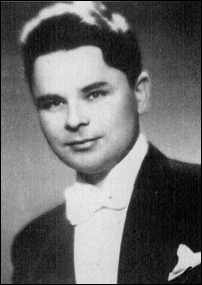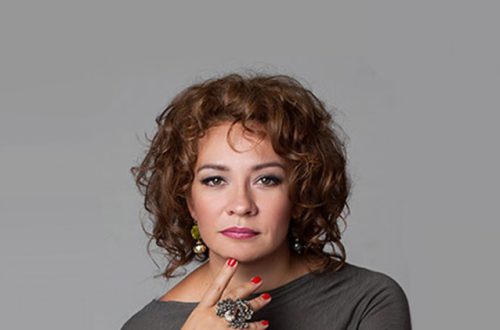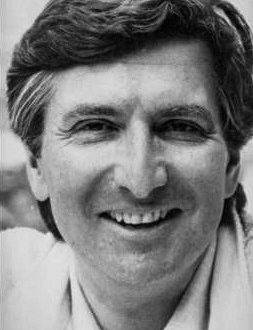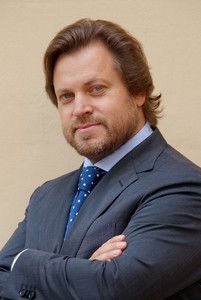
Ivan Danilovich Zhadan (Ivan Zhadan) |
Ivan Zhadan
WHAT FATE! Ivan Zhadan and his two lives
If you ask an opera lover what tenors shone on the stage of the Bolshoi Theater in the 30s, the answer will be obvious – Lemeshev and Kozlovsky. It was during these years that their star rose. I would venture to say that there was another singer whose skill was in no way inferior to these legendary personalities of the Soviet operatic art. And in some ways, perhaps, it was superior! His name is Ivan Zhadan!
Why is it not well-known, not included in textbooks and books on the history of the theater, known only to specialists? The answer will be the story of this man’s life set forth here.
Ivan Danilovich Zhadan was born on September 22, 1902 in the Ukrainian city of Lugansk in the family of a cartridge factory worker. From the age of 9 he lived in the village, where his parents sent him to study as a blacksmith. Already in childhood, Ivan’s love for singing was manifested. He loved to sing in the church choir, at weddings. At the age of 13, the young man returns home and goes to work at his father’s factory. He worked here until 1923. In 1920, during military training, Ivan was the leader of the detachment. Friends advised him to join a vocal circle. Here excerpts from operas were staged. During the rehearsals of “Eugene Onegin”, where Ivan performed the part of Lensky, the young man met his future wife Olga, who played the role of Olga Larina in the same performance (such a coincidence). In 1923, Zhadan’s talent was noticed, and the trade union sent him to study in Moscow. In the capital, Ivan entered the Musical College at the Conservatory, where he became a student of the famous singer M. Deisha-Sionitskaya, and later transferred to the class of Professor E.E. Egorov. Life in the hostel was difficult, there were not enough funds, and the young student was forced to work as a blacksmith, and then as an instructor at the Air Force Academy, where the future famous aircraft designer A.S. Yakovlev went to his students. Zhadan was always proud of this page of his life. In 1926, Ivan began to be invited to the radio. In 1927 he entered the Opera Studio of the Bolshoi Theatre, headed by K.S. Stanislavsky, who was able to appreciate the talent of the singer and his “impeccable diction”. And at the very end of the same year, the singer, having successfully passed the competition, was enrolled in the Bolshoi Theater.
Ivan’s career developed successfully. The lyrical talent of the singer, who possessed the most beautiful timbre, was noticed. After successfully performing the first responsible part of the Indian guest, he is assigned the significant role of Sinodal in Rubinstein’s The Demon (1929).
In 1930 he participated in the premiere performances of A. Spendiarov’s opera Almast. Along with performances in the theater, the artist actively travels around the country, speaking to the working people. He gives patronage concerts in the army, including in the Far East, for which in 1935 he received a certificate of honor from the hands of Marshal V. Blucher. In general, he leads a typical life of a Soviet artist, clear and cloudless, ideologically sustained. Receives enthusiastic letters from workers and collective farmers. Nothing foreshadows the coming storm.
Zhadan has more and more new roles in the theater. The roles of Lensky, Faust, Duke, Berendey (“Snow Maiden”), Yurodivy, Vladimir Dubrovsky, Gerald (“Lakme”), Almaviva (“The Barber of Seville”) appear in his repertoire.
With a group of Soviet singers (V. Barsova, M. Maksakova, P. Nortsov, A. Pirogov and others), in 1935 he made a tour to Turkey. Turkish newspapers are full of enthusiastic responses about the singer. The first president of Turkey, M. Ataturk, became an admirer of his talent, presenting the singer at one of the receptions with his personalized golden cigarette case, which Zhadan kept as a special relic.
Glory comes to the artist. He is one of the leading soloists of the Bolshoi Theatre. Repeatedly performs in the Kremlin. Stalin himself favored him, asked him to perform this or that work. Despite all this, Zhadan was easy to handle, loved and remembered fellow countrymen, inviting them to his performances. The peak of the singer’s career came in 1937. During the Pushkin Days, he is invited on tour to Riga. After the singer performed the role of Lensky, the hall gave him an unceasing ovation. The tours were such a sensation that Zhadan was asked to extend them and also perform in Faust and Rigoletto. Since there were no costumes for these roles, the Soviet ambassador to Latvia sent a special plane to Moscow (an amazing case for those years), and they were delivered to Riga.
It is worth recalling, however, that this was not just another year of success and accomplishments. It was 1937! First, the ambassador to Latvia disappeared somewhere (apparently it was dangerous to surprise in those years), then Zhadan’s friend, director of the Bolshoi Theater V.I. Mutnykh, was arrested. The situation began to thicken. The planned tour of the singer to Lithuania and Estonia was cancelled. He was no longer invited to the Kremlin. I must say that Ivan Danilovich did not belong to the number of people seeking to enlist friendship with those in power, but he took the excommunication from the Kremlin painfully. It was a bad sign. Others followed him: he received a low concert rate, in the theater he was left only with the parts of Lensky and Sinodal. Something has broken in this impeccable “machine”. The fall was coming. On top of that, I had to have an operation and remove the tonsils. After a year of silence (when many have already put an end to the singer), Zhadan again brilliantly performs as Lensky. Everyone noted the new, deeper and more dramatic colors in his voice.
It is difficult to say what fate prepared for the artist next, but then the war intervened. Life in Bryusovsky Lane on the top floor, where the singer’s apartment was, became dangerous. Endless lighters fell on the roof where the anti-aircraft gun was installed. Ivan Danilovich and his sons did not get tired of throwing them into the yard. Soon the eldest son was taken into the army, and the whole family moved to a dacha in Manikhino, where the singer built a house with his own hands. He thought it would be safer here. Many artists lived in this place. On the site Zhadan dug a trench. It was easier to escape shelling in it. During one of the swift advances of the Germans, the path to Moscow was cut off. And soon the invaders themselves appeared in the village. Ivan Danilovich recalled how it happened:
- Manihino was captured by the Germans. There were many of us, soloists of the Bolshoi Theater, then. So, an officer entered my house, where an accompanist who knew German well, baritone Volkov and several other artists were with me at that time. “Who are they?” he asked sternly. “Artists,” the terrified pianist murmured to death. The officer thought for a moment, then his face brightened. “Can you play Wagner?” Volkov nodded his head in the affirmative…
The situation was hopeless. Zhadan knew how his best friend A. Pirogov was accused of not being evacuated from Moscow to Kuibyshev. Who cared about his sick wife? Only when the accusations became threatening (they began to say that Pirogov was waiting for the Germans), the singer was forced to evacuate with his seriously ill wife. And here – being in the occupied territory! Ivan Danilovich was not a naive person. He knew that it meant one thing – camp (at best). And he, his wife and younger son, together with a group of artists (13 people) decide to leave with the Germans. How right he was! (although I learned about it much later). His 68-year-old mother-in-law, who did not dare to go with them, was exiled to the Krasnoyarsk Territory. The same fate awaited the eldest son, who was rehabilitated only in 1953.
The “second” life of the artist began. Wanderings with the Germans, hunger and cold, suspicions of espionage, which almost led to execution. Saved only by the ability to sing – the Germans loved classical music. And, finally, the American occupation sector, where the singer and his family ended up at the time of the German surrender. But the bad days didn’t end there. Everyone knows that for the sake of certain political interests, the allies agreed with Stalin on the extradition of all displaced persons. It was a tragedy. People were forcibly sent to certain death or to camps by representatives of the vaunted Western democracy. Zhadan and his wife were forced to hide, live apart, change their last names, as the Soviet special services also hunted for defectors.
And then another sharp turn comes in the fate of Ivan Danilovich. He meets a young American Doris (she was 23 years old). They fell in love with each other. Meanwhile, Zhadan’s wife Olga falls seriously ill, and a German doctor performs a complicated operation on her. Doris, thanks to connections with acquaintances of the US Secretary of State, manages to smuggle Ivan Danilovich, and then his wife, to America. After recovery, the wife gives a divorce to Zhadan. Everything happens peacefully, until the end of her days Olga remains a friend of Ivan. She manages to see her in Poland (where her sister lived since 1919) with her eldest son, and in 1976 even visit him in Moscow. Olga Nikiforovna died in the USA in 1983.
Ivan Danilovich did not succeed in his singing career in America. There are many reasons. The trials that fell to his lot, and even 50 years of age, did not contribute to this. Besides, he was a stranger in this world. He managed, however, twice (helped by his young wife Doris) to give concerts at Carnegie Hall. The performances were very successful, they were recorded on records, but they did not continue. The American impresario was not up to him.
Ivan Danilovich’s dream was to settle in a warm region on the ocean. And he fulfilled his dream by finding refuge on the small island of St. John in the Caribbean, where only 1000 people (mostly blacks) lived. Here the labor skills of his youth came in handy. He worked as a bricklayer at one of the Rockefeller firms, saving money for his plot of land. Having acquired land and mastered it with his own hands, Zhadan built several cottages on it, which he rented out to tourists from America and Europe. It cannot be said that he was not at all known in the West. He had friends, including eminent ones. He was visited by the President of Finland M. Koivisto. with whom they sang a duet in Russian “Black Eyes” and other songs.
He did not hope to ever visit his homeland. But fate again decreed otherwise. New times have begun in Russia. In the late 80s, contact with his son became possible. In 1990, Ivan Danilovich was also remembered. A program about him was broadcast on television (it was hosted by Svyatoslav Belza). And, finally, after half a century, Ivan Danilovich Zhadan was able to set foot on his native land again, to hug his own son. This happened in August 1992, on the eve of the artist’s 90th birthday. He learned that many friends did not forget him, they helped their son in difficult years (as, for example, the singer Vera Davydova, who was busy in the Stalin years about his Moscow residence permit). And the son, when asked if he reproaches his father for the years lost in exile, answered: “Why should I reproach him? He was forced to leave his homeland by circumstances that no one can explain … Did he kill someone, betray someone? No, I have nothing to reproach my father for. I am proud of him” (1994 interview in Trud newspaper).
On February 15, 1995, at the age of 93, Ivan Danilovich Zhadan died.
E. Tsodokov





